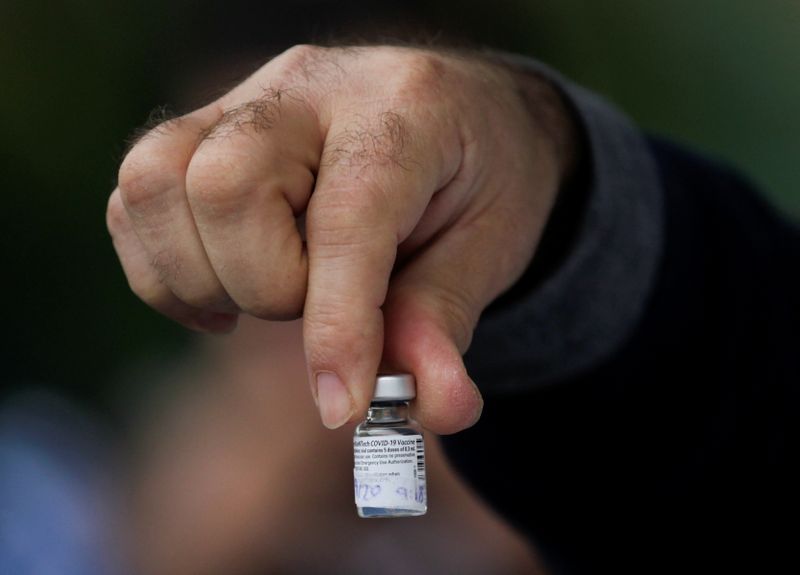By John Miller
ZURICH (Reuters) - Britain on Wednesday became the first country to approve AstraZeneca (NASDAQ:AZN) and Oxford University's home-grown UK COVID-19 vaccine, adding an easy-to-manage shot to the arsenal of a nation desperate for pandemic relief.
Even so, scientists - and regulators in Europe, following the Brexit divorce - are sceptical, given confusion over trial results earlier that left experts questioning the robustness of the data.
HOW DOES THE ASTRAZENECA SHOT'S EFFICACY STACK UP TO OTHERS'?
The AstraZeneca/Oxford vaccine's efficacy in preventing symptomatic infections was 70.4%, according to interim data, after 30 of 5,807 people who got the two-dose vaccine developed COVID-19, compared with 101 of 5,829 people who got a placebo.
That compares with the 95% efficacy of the two-shot vaccine from Pfizer/BioNTech, the other vaccine approved in Britain.
While efficacy with any dose after one dose was pegged at 52.7%, the UK's Medicines and Healthcare products Regulatory Agency (MHRA) regulator also said an "exploratory analysis" of trial participants who got one full dose showed efficacy of 73% from 22 days after the first shot.
The UK regulator recommends a booster shot four to 12 weeks after the first dose, because up to 80% efficacy was reached with a three-month interval between shots, an official involved in the MHRA approval said.
"The first dose efficacy gives an indication of protection for a short period between the two doses, the second dose strengthens the immune response and is expected to provide a more durable immune response," the University of Oxford, AstraZeneca's partner, said.
Confusion over efficacy emerged after interim late-stage trial results announced in late November when AstraZeneca acknowledged that people in its clinical trial accidentally got different doses.
Those who received a half dose of the vaccine, followed by a full dose, were shown to have 90% protection, the company said initially, while two full doses offered only 62% protection.
Now, however, the MHRA said the half-dose regimen's results were not borne out in analysis.
"It's all much more confusing because mistakes have been made, genuinely," one European Medicines Agency (EMA) official told Reuters. "Mistakes that resulted in clinical data that was much more complex to interpret than Moderna (NASDAQ:MRNA)'s and Pfizer (NYSE:PFE)'s. And on top of that the efficacy is lower."
WHAT ARE THE OTHER DIFFERENCES?
Technology, price and storage.
The AstraZeneca shot is a "viral vector vaccine", where a specially engineered virus that normally causes chimpanzees to get the common cold delivers genetic instructions to human cells to make the spike protein jutting out from the new coronavirus's surface.
The Pfizer/BioNTech and Moderna vaccines use a new technology which packs messenger RNA (mRNA) inside tiny fat droplets to instruct cells to make the spike protein.
AstraZeneca pledged the vaccine would cost just a few dollars per dose and be sold without making a profit, whereas Pfizer's vaccine costs $18.40-$19.50 per dose.
A separate mRNA vaccine from Moderna, approved in the United States, costs up to $37.
The AstraZeneca shot does not require deep freezing at minus 70 degrees like the mRNA vaccine from Pfizer and its German partner, BioNTech, and has already been produced by the millions of doses.
It can be kept in a standard refrigerator for six months.
It is also cheaper to make, bringing hope to developing countries largely left out of the early vaccine haul.
NOW THAT THE UK HAS APPROVED THE VACCINE, WILL OTHER GOVERNMENTS FOLLOW?
When Britain signed off on Pfizer/BioNTech's vaccine in early December, that pressured regulators elsewhere, and the United States and Europe followed in short order.
Moderna's similar mRNA vaccine has also received U.S. approval.
Britain's move now to back AstraZeneca's shot prioritises getting as many people inoculated quickly, before all the answers about efficacy and optimal dosing are in.
Absent safety concerns, British regulators may be making a trade-off between waiting for perfection and making do with what they have.
"A swift emergency approval implies taking the risks of a lower (or) shorter efficacy than may be reached with mRNA vaccines," said Claire-Anne Siegrist, vaccinology and immunology head at Geneva's University Hospitals.
While an EMA official said this week the shot is unlikely to be approved before the end of January, a top German vaccine official said on Wednesday he still expected a "quick decision" by Europe since its rolling review process is well advanced.
The EU drug watchdog is carrying out a review for a conditional market approval, rather than the UK's speedier emergency use approval.
India's drug regulator is also discussing emergency approval of the AstraZeneca vaccine, being made in partnership with the Serum Institute of India.
WHO WILL GET WHICH VACCINE?
England's National Health Service will not give people a choice of vaccine.
But with several now available, countries need to decide who should get which vaccine, as some people may prefer the shots with higher efficacy.
Experts said the differences between the efficacy rates are significant, prompting tough choices.
"In countries where both the mRNA and the AstraZeneca vaccines would be available, whom do you decide to give the less effective vaccine?" Siegrist said.
Thomas Mertens, head of STIKO, Germany's expert panel on vaccine use, told Reuters that his group plans to address this issue "in the near future" as it hopes to tailor a strategy that makes the biggest impact with limited supplies.
Some experts, however, said that choice may be a luxury countries cannot afford.
"At this juncture, we don't have vaccine in sufficient quantities to reach all those who need it," said Thomas Klimkait, a University of Basel professor and researcher who is working on a Swiss SARS-CoV-2 vaccine project.
"I would say at this moment that every vaccine with relatively good efficacy - that means, at least 60 or 70% - should be put to use, when it has an appropriate safety profile."
